How a mother’s love and a miracle gave Xavier Mahabelo a second chance
When a car hit Xavier Mahabelo so hard it ripped the skin and muscle clean off his leg, his only shot at survival was on the other side of the world in a Melbourne hospital.
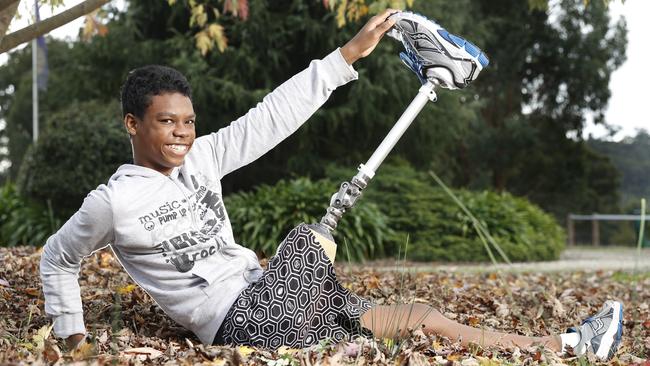
VWeekend
Don't miss out on the headlines from VWeekend. Followed categories will be added to My News.
Xavier Mahabelo was desperate for his nurses and doctors to lift the sheets so he could see where his right leg used to be.
He’d just woken up from brutal surgery to amputate his right leg, and patients are usually given more time to adjust before being confronted with the full reality of what has happened – especially when they are a 15-year-old boy.
Still, Xavier was adamant he needed to see, so the sheet was lifted.
To everyone’s amazement, his face lit up with a beaming smile.
“I wasn’t scared or nervous,” Xavier says.
“I was surprised when I saw my leg had gone. Then I said to myself, ‘it’s no longer there’.”
To understand why Xavier was so happy, you must first try to understand where he has come from – and then try to figure out how on earth he survived for more than a decade before help finally arrived from the other side of the world.
Just four years old, Xavier was playing in his home streets of Toliara, Madagascar, when he stepped onto the road without thinking.
“I played, that’s why I had the car accident. I didn’t see the car, I crossed the road and the car came so fast and hit me,” Xavier explains with a translator.
“I was four years old, I was still a small kid … I cried.
“I cried while my father held me and took me to the hospital, and we stayed there during seven months.”
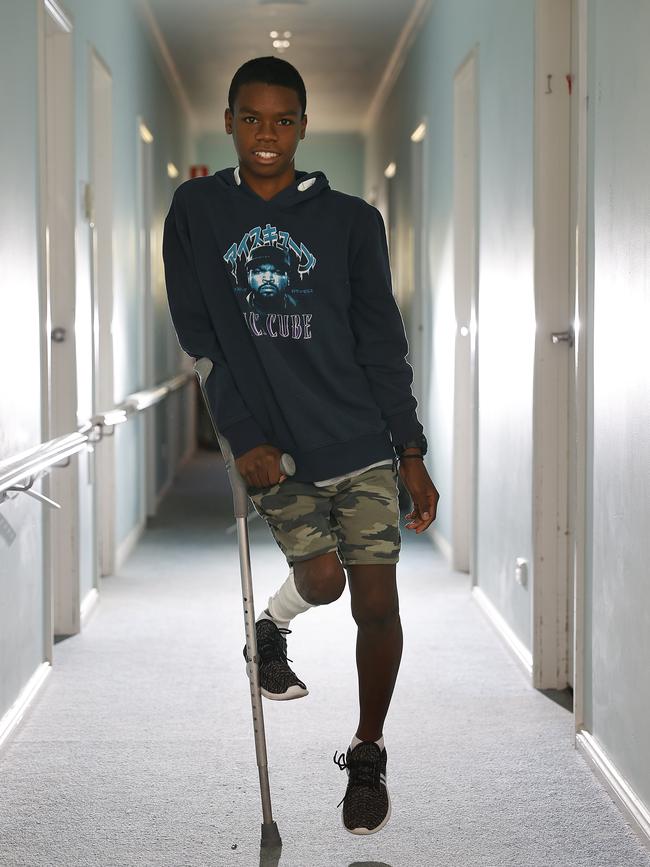
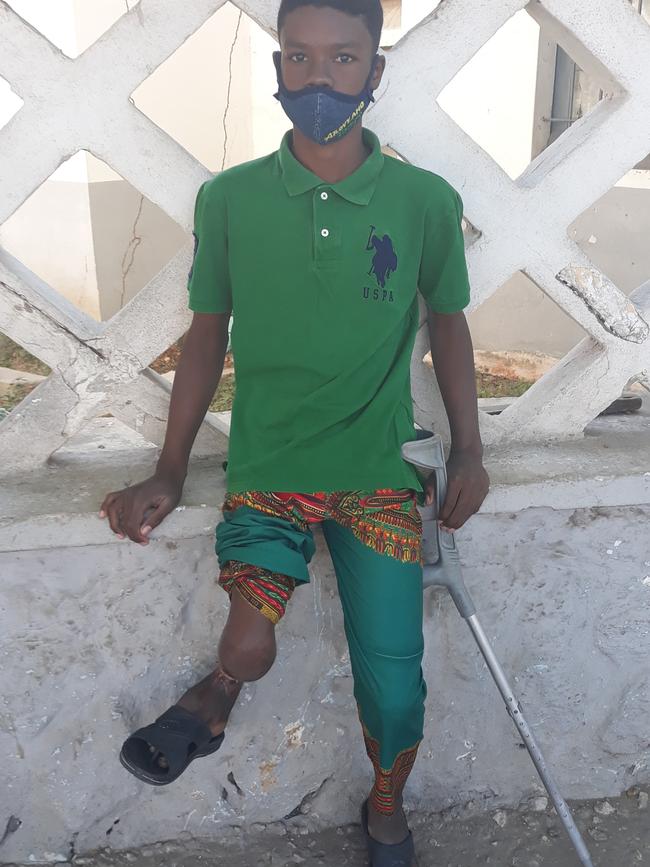
The driver stopped only briefly to see if the boy he’d struck was still alive, but the scene was horrific and he sped away.
Somehow, Xavier was alive. But all the skin, muscle and other tissue covering the bones of his right leg had been ripped off. All that remained was exposed broken bones bent at a 110-degree angle below his knee, then twisted another 90 degrees at the ankle.
“I thought my son was dead there,” Xavier’s mother, Romule, said, with the help of an interpreter.
However, Xavier’s biggest danger did not come in the split second he was struck by the car. It would play out over more than a decade of living in a country with no medical treatment or specialists able to help him.
Months in hospital saved Xavier’s life, but nobody in Madagascar had the skills or equipment to repair, or even remove his leg.
Below his knee, much of the tibia and fibula were open to the jungle conditions where he lived, making him susceptible to infection.
In time, skin formed to cover the wound but it was soon taken over by chronic ulcers, a ticking time bomb that would eventually become cancerous – if an infection didn’t kill Xavier first.
“We were at the hospital during seven months,” Romule said.
“And then we also consulted traditional healers in the country, very, very far from the city, during eight months. Also we used Malagasy medicine because we couldn’t afford the treatment from the doctors anymore.
“After that, many foreign missionaries came and said they had no solution.”
Aware her son’s chances of survival were slim, and unable to even access antibiotics, Romule wandered far across Madagascar with Xavier to see traditional healers as their ointments, concoctions and rubbing leaves were his only option.
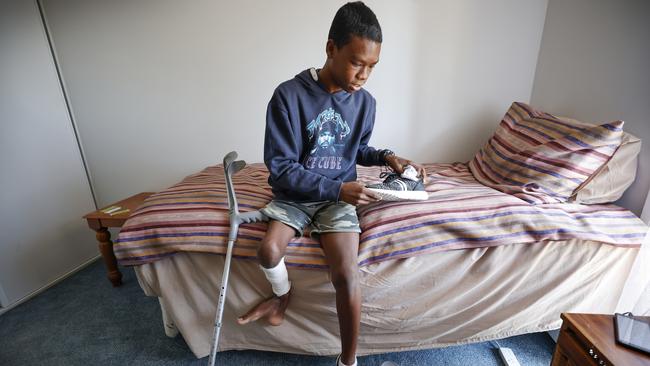
Above all, Xavier, his parents, two sisters and five brothers worked tirelessly to keep his leg as clean as possible to at least delay a deadly infection.
Somehow Xavier continued to survive, though with a dangling right leg that provided no support it was difficult for him to go to school, play or have friends.
“My life was suffering,” he said. “I could not do anything, I just sat and stayed there, I did nothing.
“I had no more hope. I even thought that I will have cancer and I will be dead with it.”
Long before Ballarat orthopaedic surgeon Dr Shaun English and his wife, Dr Lydia Johns Putra, touched down in Madagascar in 2019, their Australian Doctors in Africa contingent was eagerly anticipated.
“Before we go over there, they run some ads on the radio and tell people the Australian doctors are coming,” Dr English said.
“So, when you arrive, you see people of all conditions walk out of the bush and you see all sorts of stuff.
“You’ve got those who don’t need anything, those who need too much, and those from the middle ground where we can do something to help.”
One man presented after being shot in the foot two years earlier, though with little treatment he’d developed gangrene and had a bone sticking out.
Dr English partially amputated the man’s foot to save his life in such a way he would be able to continue walking.
But then a boy appeared with injuries that were off the scale.
After an examination, Dr English was even more amazed to realise Xavier had survived a decade with such massive, untreated injuries.
“His leg was just a mess,” Dr English said.
“It was a constant threat to him. Long term he would have had chronic multi-organism – including fungal – infection, and you can expect malignant transformation.”
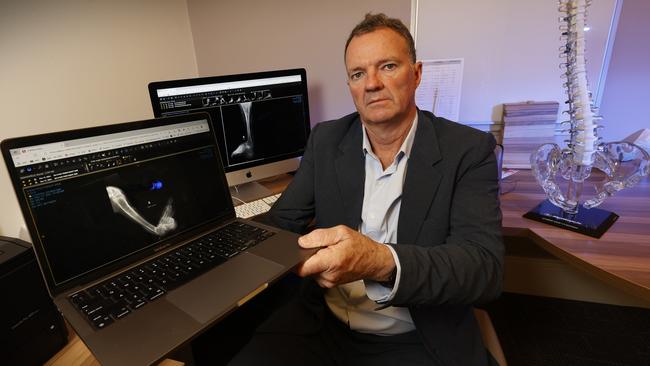
Dr English had to tell Romule there was no way to repair Xavier’s leg – not even a safe way to amputate it in Madagascar to save his life.
Still, he promised to speak to colleagues in Australia and see if there was another way to help.
For Romule, the pledge brought hope that her 11-year search for help might end.
“I cried beside him (when) he said that he will try to find a man to help him,” she said.
“I told him that my son is just like a dead person because he has cancer, we are in a countryside, we have nothing, we don’t have medicine for it, and we use Malagasy remedies.”
Deciding whether or not to fly patients around the world for treatment can be a controversial and heartbreaking process. For the same cost and resources, teams like the Australian Doctors in Africa can treat 20 people on the ground in their homelands.
But touched by Xavier’s situation, Dr English emailed his friend, Professor Leo Donnan, for advice.
Within hours, Professor Donnan had not only offered to perform the surgery himself in Melbourne, but had come up with a perfect way of getting Xavier to Australia – the Children First Foundation.
Having brought more than 400 children from all corners of the world to Australia since 1999, the Melbourne-based charity already had a network in place specialising in cases such as Xavier’s.
When Professor Donnan contacted CFF outlining Xavier’s risk of developing cancerous squamous cell carcinoma, CFF program operations manager Marina Te Maro said she was in no doubt they had to act immediately.
“We take the complicated cases. We take the child from their country and we deliver them back home and, in between, they stay with Children First at the retreat (in Kilmore East),” she said.
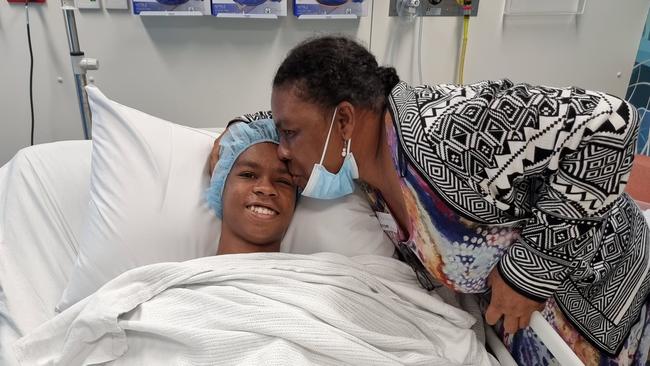
CFF contacted St Vincent’s Private Hospital – where Professor Donnan had already undertaken many of the 100 surgeries the hospital has provided pro bono for the charity – and they were only too willing to again offer operating theatres, staff and resources for the surgery.
“Enabling children like Xavier to achieve their full potential, while receiving first-class compassionate and excellent medical and hospital care is a gift; the essence of why we do what we do,” St Vincent’s Private clinical services director Jenny Gozdzik said.
“When the children are in the hospital, there is a wonderful energy among all of our team. It allows each of us to play a small part in a big story of hope.”
The charity and hospital fast-tracked Xavier to arrive in early 2020, and Dr English gave Romule the news she’d waited more than a decade to hear.
“Finally, we thank God because the doctor asked us and they helped us,” Romule said.
“We have accepted that his leg will be removed because, for us, he was dead and you have rescued him.”
On March 19, 2020, just days before Xavier was set to fly to Melbourne, it was announced Australia’s borders were closed to non-citizens due to the Covid pandemic.
With the entire world grinding to a halt, there was nothing anyone in Australia or Madagascar could do other than hope Xavier’s condition did not deteriorate before the Covid situation eased.
“We thought it was going to be over … and then 2021 appeared and we were still in the same situation, though we could bring kids here on compassionate grounds,” Ms Te Maro said.
“Leo was adamant he needed to get here on compassionate grounds because the longer he left it, the greater the risk that it would turn cancerous.”
With no pandemic end in sight, CFF spent five months filing paperwork with federal government officials so Xavier could enter the country on compassionate grounds.
In Madagascar those efforts even saw the deputy Australian ambassador escalate the case. Finally the two nations stepped in to back efforts to save Xavier.
At 2am on November 30, 2021 – while most of the world was still closed – Xavier and Romule were able to leave Madagascar for the first time in their lives, though the travel was a nightmare.
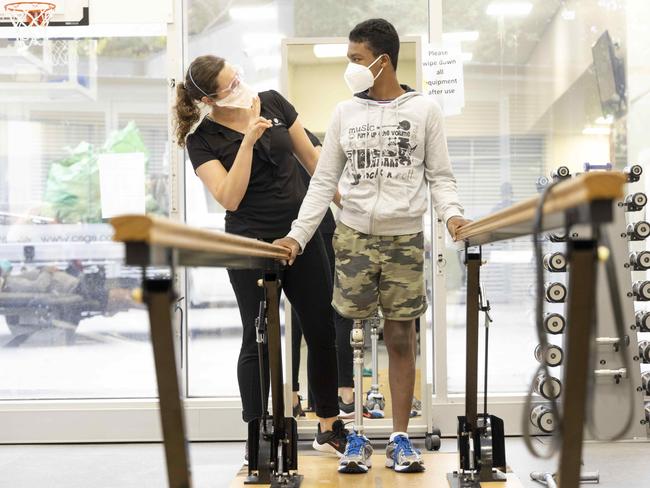
Too young to qualify for a Covid vaccination in Madagascar, Xavier was stopped in Paris and barred from proceeding. While paperwork was eventually able to clear his path, the delay meant that when they finally arrived in Dubai there was no translator waiting to help them.
In a world unlike anything they had ever experienced, and with nobody speaking their language, Romule and Xavier became lost in the airport and messages over the public address system could not help track them down.
Eventually the president of the Malagasy Association based in Dubai drove to the airport in person and found the mother and child safe in terminal 3, before connecting them to Melbourne, 22 tense hours later.
On December 22, 2021 Professor Donnan examined Xavier for the first time. There was no doubt his leg needed to be removed as soon as possible.
The amputation was pencilled in for the next month but, on January 18, Covid surged and Victoria’s hospitals were plunged into a “Code Brown” – cancelling all non-urgent surgery.
With examinations confirming Xavier’s life was in danger, Professor Donnan and St Vincent’s rebooked the surgery for February 7 as an urgent case, and the patient’s hopes rose.
“Firstly, I am happy. I will be like many normal people. I will walk, I will play, I will go for a stroll, I will go to school,” he said in the lead up to surgery.
As far as amputations go, the surgery was unusual and complex.
Because Xavier’s knee had fused together, his leg had to be removed at his thigh. Worse, the skin that would normally be used for flaps to seal the bottom of a stump was contaminated and potentially cancerous, so Professor Donnan had to cut even higher.
Professor Donnan had become all too accustomed to the reaction from children following far less brutal amputations: “They hate you. It takes a long time to build that relationship up again.”
But, when Xavier woke in St Vincent’s Private and asked to see his leg, his reaction stunned all around him.
“When he saw it was gone he had the biggest smile on his face,” Professor Donnan said.
Ms Te Maro understood that for Xavier and Romule that moment was not a confirmation he had lost a leg, but that he had gained a life.
“That boy was wanting to make sure it was gone,” she said.
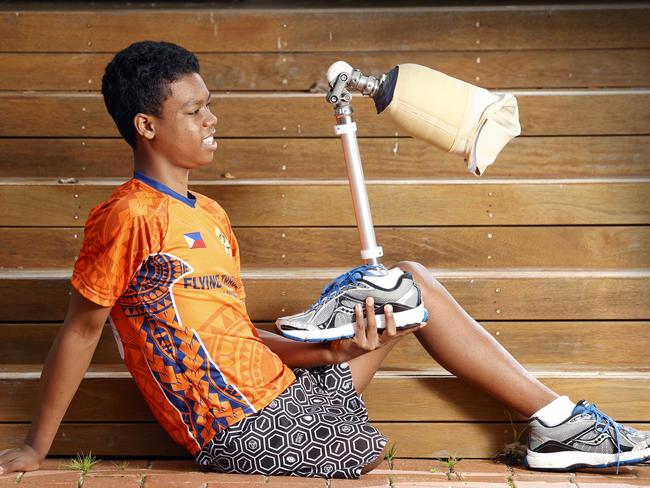
“He wanted his leg gone because he had been carrying it around for 11 years. His amazing mother had kept it clean through all the years using the plants and anything else available so it wouldn’t get infected, but it was a time bomb having that leg.”
A fortnight later, Xavier began learning how to use a right leg for the first time in 11 years.
During his first appointment at ProMotion Prosthetics, his stump was measured and analysed so work could begin on making him a customised limb.
Sore after the initial appointment, it was several weeks before Xavier returned. But he then embraced weekly sessions, learning to stand, walk and build new muscles and nerves while a perfect fit was refined.
Three months of pro bono physiotherapy at Epworth Rehabilitation were also undertaken to fast-track Xavier’s efforts to walk without crutches so he could one day return home.
In between the appointments, Xavier pushed himself through his own program, walking with a frame or crutches on the CFF farm to collect the mail, undertaking daily physiotherapy exercises, and standing to eat his breakfast.
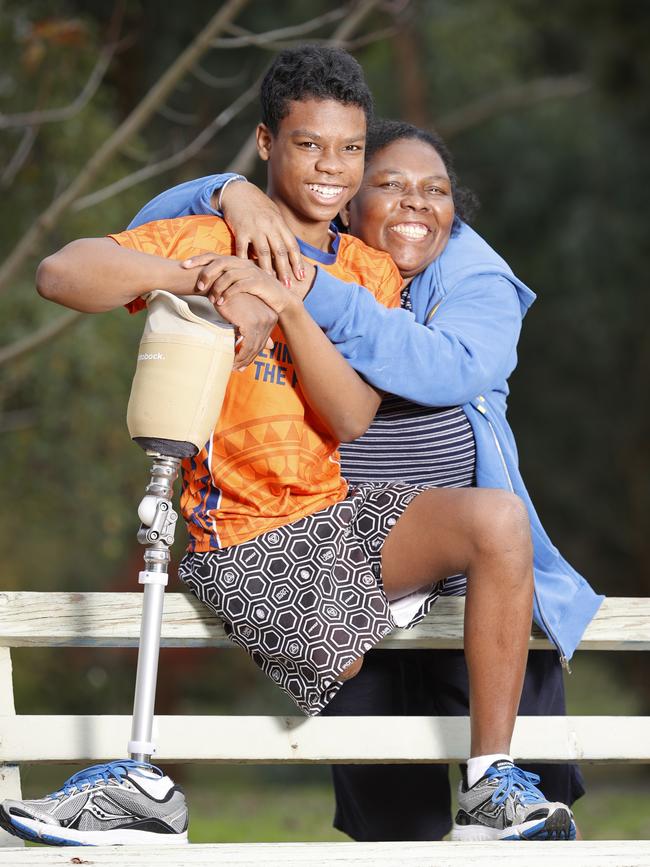
“It was quite difficult to learn the first time. It was very difficult and strange as I am not used to it yet … I am still accustomed to walking with one leg,” he said.
By April 12, Xavier was able to walk into Professor Donnan’s Parkville clinic for his first post-surgery check-up with the help of a walking frame.
“There are no issues with that stump. It should be able to tolerate anything now,” Professor Donnan said after the review. “This is a reasonably high-above-the-knee amputation. It takes a long time to get independent control over it.
“Because he’s never used that limb, he’s never used these buttock muscles, or any of those muscles at all – they have years and years and years to catch up.”
It was decided that Xavier would need to be able to walk independently without crutches for reasonable distances before returning home, where he will not have the benefit of rehabilitation specialists.
But, having seen the remarkable progress Xavier had already pushed himself to, Professor Donnan booked another appointment for June, confident he would be ready to go home and stand on his own two feet – though he still can’t fathom how he ever made it this far.
“All that was left was scar tissue, infection and bone. I don’t know how he avoided infection or developing a tumour … He’s got a few years to catch up on. But once he gets used to it and gets the fitting and everything right, he’ll walk with a pretty good gait.”
With the finishing touches now being made to his permanent leg, Xavier is continuing the hard yards to convince Professor Donnan, his CFF carer and the rest of the team that he is ready to go home, with plans to follow in their footsteps.
“When I get back to Madagascar, when I am home, I will go to school,” he said.
“After finishing school I want to be a doctor. I will treat people and help people like they do.
“I just want to thank the doctors because without them, I will not be able to do all of that. Yes, I am happy.”
To support Children First Foundation in helping children like Xavier, visit www.childrenfirstfoundation.org.au


